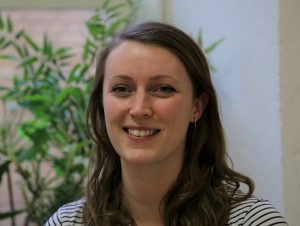Lauren Sumner-Rooney

Please briefly introduce yourself and what you are currently doing
I’m a research fellow at the Museum of Natural History and an associate of the Department of Zoology. My research focusses on the evolution and function of vision in invertebrate animals, including X-ray imaging of eyes, behavioural experiments, and evolutionary biology.
I have also just started a new role as a stipendiary lecturer at Keble College
When did you join St Anne’s and how have you found your time at the College?
I joined St Anne’s as a postdoctoral fellow in September 2017, but I was actually an undergraduate here! I graduated in 2012 and was very excited to return. College is as welcoming and friendly as I remembered, and I’ve loved having the opportunity to come ‘home’.
What is your favourite place in Oxford?
The top of South Parks, with its view of the city, on a sunny evening.
What is your specialist subject and how did you become interested in this area?
I study the form and function of animal eyes, including molluscs and echinoderms (the group that contains starfish and sea urchins). I now mostly work on spiders, using specimens from the museum collection to study how their eyes work and how they’ve changed over time. I got interested in vision through one of my final-year modules as an undergraduate, and thought it was fascinating that animals can see the world totally different from us, even using UV and polarised light to see things that are invisible to humans.
Have you found any challenges working in academia? If so, how have you overcome them?
Working in academia involves a lot of rejection! This can feel really personal, as you spend a lot of time and love on your ideas. I still find this difficult to deal with, but the successes also grow slowly over time, and it’s important to remember them, too. There’s a lot of instability and moving around as well – I once moved house three times (between three countries) in 18 months, which gets expensive and stressful. But it’s also a huge privilege that I was able to do that.
What is your advice for any others looking to pursue academia?
Follow your ideas! If you’re passionate, creative, and dedicated, it’s amazing to have the freedom to develop your own research. Try to cultivate skills in a couple of different areas – it will often give you a new perspective and can be invaluable in helping carve out a unique academic niche.
Have you joined St Anne’s from another institution? If so where and how do you find the two places differ?
Before coming back to Oxford, I studied my PhD at Queen’s University Belfast and then a post-doc at the Museum für Naturkunde in Berlin. St Anne’s has a very intimate community, and it’s great to have the chance to mix with academics from other disciplines, which I had really missed.
What is your favourite way to relax?
A long walk with friends (and a pub at the end…)